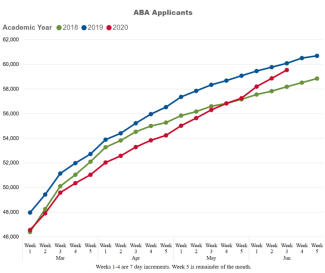LSAT-Flex and Supporting Candidates During COVID-19
This post originally appeared on TaxProf Blog on June 23, 2020. View the original posting.
We have just completed the June administration of the LSAT-Flex, the online, remotely proctored delivery of LSAT that we designed to give law school candidates the opportunity to complete their application to law school despite the COVID-19 restrictions on travel and large gatherings.
More than 8,000 candidates took the LSAT-Flex last week, bringing to nearly 18,000 the number of candidates who have successfully completed the LSAT-Flex over the past 5 weeks. Many of these candidates are applying for admission to law school this fall, and schools are delighted to be able to continue to count on the same score scale and the reliability, validity, and fairness of the LSAT as one factor in their holistic admission decisions. Each year, roughly 99% of law school matriculants include an LSAT score in their successful applications.
Obviously, an online, remotely proctored test raises important questions of equity and access to technology. LSAC was committed to helping every test taker to have the equipment and resources they needed.
We proactively asked test takers to let us know if they needed assistance with a computer or a secure internet connection or a quiet and appropriate place to take the test. We provided roughly 200 loaner computers to test takers for each of the May and June tests, and we offered hotel vouchers to any candidates who indicated they needed a reliable internet connection or a quiet place to test. We will continue to take every step possible to ensure that the extraordinary testing measures required by the COVID-19 emergency do not set back our shared efforts to increase diversity, equity, and inclusion in legal education.
Creating a whole new testing format in the span of three months was a daunting challenge, but we viewed it as critical to providing candidates with the opportunity to earn a score and continue their law school journeys. The COVID-19 crisis had created a significant and growing shortfall in the number of candidates applying to law school this year. Just two weeks ago, applicants for fall 2020 admission were lagging more than 1,400 behind last year, and the gap was widening. Since the May LSAT-Flex scores were released on June 5, we have seen a surge in applications that has cut the gap by nearly 60 percent. Thanks to the May LSAT-Flex scores, more than 1,600 new candidates have applied for fall admission in just the past two weeks, and applications continue to be way above normal levels for this time of year. With continued strong applications based on the May test scores, and June LSAT-Flex scores coming out on June 30, it is possible that 2020 applicant levels may equal or even exceed 2019 levels, which were the highest since 2012!

As Paul pointed out in his June 1 blog post, the shortfall in applicants was particularly acute among some key groups, but we have seen great progress over the past few weeks. On May 31, the number of Black or African American applicants was lagging 5.3 percent behind 2019; now that gap has dropped to 1.5 percent and continues to shrink. Hispanic/Latinx applications were down 1.5 percent as of May 31; now, Hispanic/Latinx applications are actually running 0.8 percent above 2019 levels.
Figures for other demographic groups are below, which show improvement for many groups, but still a pressing need to further build the pipeline of diverse candidates for law school. Needing particular attention is the American Indian/Alaska Native category, which LSAC supports through our partnership with the American Indian Law Center and other measures. The Native Hawaiian and Other Pacific Islander numbers are also concerning, and we are committed to working to improve those as well.
|
Group |
May 31 |
June 21 |
|---|---|---|
| Aboriginal or Torres Strait Islander Australian | -37.5% | -37.5% |
|
American Indian or Alaska Native |
-6.4% |
-4.9% |
|
Asian |
+1.3% |
+3.6% |
|
Black or African American |
-5.3% |
-1.5% |
| Canadian Aboriginal/Indigenous | +26.2 | +25.6 |
|
Caucasian or White |
-4.1% |
-2.2% |
|
Hispanic/Latinx |
-1.5% |
+0.8% |
|
Native Hawaiian/Other Pacific Islander |
-7.6% |
-6.4% |
|
Not Indicated |
+1.9% |
+3.7% |
|
Puerto Rican |
-0.0% |
+3.3% |
Behind every one of these numbers is a human story — a student with a dream of attending law school in order to contribute to their community and make the world a better place. As the protests against systemic racism in communities all across America and the economic, geographic, and racial disparities of the COVID-19 pandemic make abundantly clear, we desperately need more lawyers who can help our communities recover and rebuild in a more just, equitable, and sustainable manner. We are committed to doing everything we can to open the doors to legal education, now more than ever.

